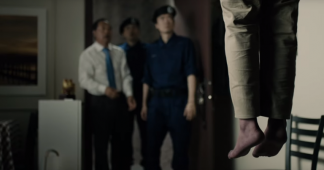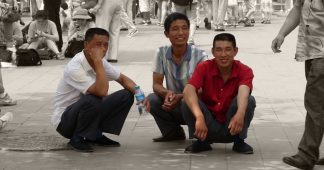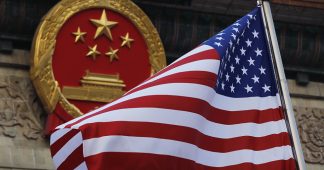Review written by Friends of Socialist China co-editor Keith Bennett
The 100th anniversary of the founding of the Communist Party of China has been the occasion for many grand and impressive events throughout July. 1921, which has also been playing in selected cinemas in Britain and Ireland, and doubtless elsewhere, is the film for the centenary.
A feature film, with special effects worthy of any Hollywood blockbuster, it also features some documentary footage, skilfully heightening the sense of both drama and realism.
Whilst 1921 is focused on that momentous year, it deploys flashbacks as far as the 1850s, showing China’s degradation to a semi-colonial and semi-feudal ruined nation and then at its conclusion a potted but vivid historical reconstruction of subsequent years, which culminates in Chairman Mao proclaiming the founding of the People’s Republic on October 1st 1949, as well as Young Pioneers visiting the restored site of the first party congress 100 years later.
A similar historical technique is deployed to depict aspects of some of the key characters, including such pioneering Chinese communists as Li Dazhao, Chen Duxiu, Li Da and, of course, Mao Zedong. Particularly moving is the depiction of the tragic and heroic fates of some of the key early martyrs of Chinese communism, including Yang Kaihui, Mao’s first wife and great love. This provides a raw and poignant contrast to the youthful idealism, frenetic activity and infectious optimism of many of the key characters as they throw themselves into the preparations for the founding of the party whilst simultaneously immersing themselves in the surging movement of the young but extremely militant Chinese working class along with the youth and students. Shanghai, in particular, where the party was founded, is accurately depicted as a playground for wealthy Chinese and above all for foreign overlords, but as a living hell for the masses of Chinese people.
Whilst the leading characters are presented in a more all-round, nuanced and ‘human’ way than was typical of an earlier period of Chinese revolutionary cinema, the film successfully combines action and romance with skilful expositions of key political questions. Quite lengthy readings from the Communist Manifesto highlight the young revolutionaries’ wholehearted embrace of the need for class struggle leading to the establishment of the dictatorship of the proletariat, and their rejection of the reformism of the Second International, whilst the question of whether communists should hold office in a progressive bourgeois government, such as that of Dr. Sun Yat Sen, is touched on in the case of Chen Duxiu. And in one short but highly significant scene Mao Zedong raises the importance of the peasant question, to the initial scepticism of his comrades. It was, of course, Chairman Mao’s grasp of the peasant question, and of the role that the peasants could play in the revolution in a country such as China, that created the conditions for victory and secured his eternal place as one of the greatest and most original leaders and theoreticians of the global communist movement.
Also central to the political thrust of the film is the role played by the Communist International (Comintern). The two representatives from the Comintern who attended the CPC’s founding congress are rightly portrayed as heroic and selfless individuals, with some nail-biting scenes worthy of any genre of action movie. And the need to follow the path of the Russians, of the victorious October Revolution, is consistently highlighted. But there are also some pretty heavy hints of future tensions between the CPC and the Comintern, focused on the Chinese communists’ determination to forge an independent path as something intrinsic to their nation-building project.
The role of the Comintern representatives in liasing with the fledgling Japanese Communist Party in Shanghai is also featured.
The panoramic sweep of this film also takes us beyond China – to the Kremlin in Moscow, where we see Lenin addressing a congress of the Communist International, and to Paris, where we see the struggles of the Chinese workers and students to get organised under the banner of Marxism and to build support for China’s struggle among the French public. Here we are introduced to a 17-year-old Deng Xiaoping, with the affectionate name his comrades gave him at the time, Doctor of the Mimeograph, for his skill and diligence in producing revolutionary literature under difficult conditions.
1921 is a touching, exciting and profound film – both great entertainment and a great education. It needs to be widely viewed, whether in China or around the world: for young Chinese people so that they might better know the struggles and sacrifices of their forebears that have made possible today’s increasingly strong and prosperous socialist China; and for those of us in the non-socialist world, who may sometimes feel daunted by the enormity of attempting to transcend the outmoded system of capitalism, to be reminded that a better world is indeed possible and that even a small number of people, with no resources to speak of, can really help to make it happen, so long as they have the spirit, in Marx’s words, to “storm heaven”.
Or as Chairman Mao put it in his poem Chingkangshan Revisited:
“Nothing is hard in this world if you dare to scale the heights”
Published at socialistchina.org











